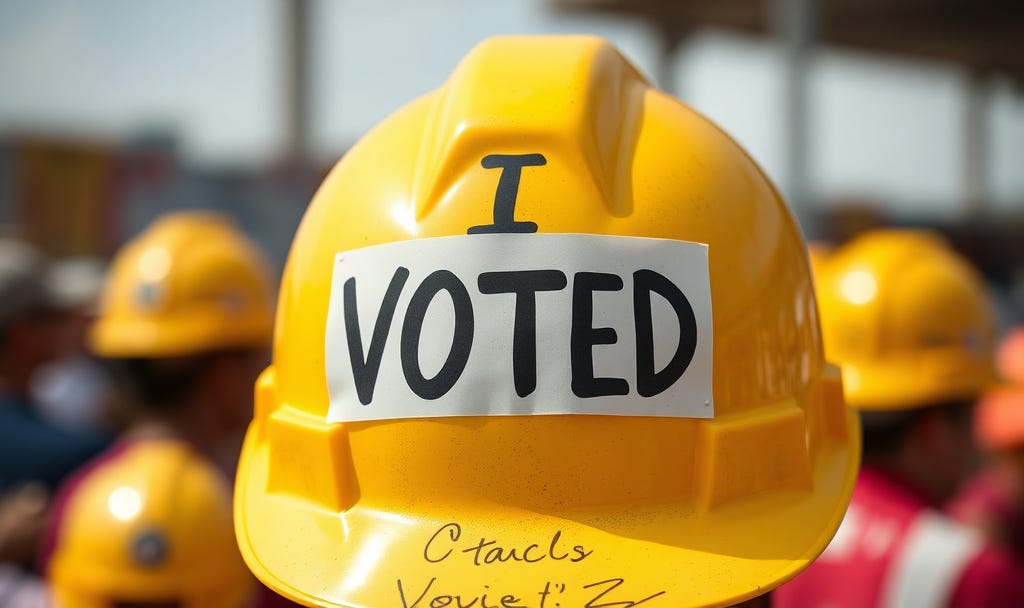The 2024 postmortems are unanimous: Dems need to win back the working-class
In the wake of the 2024 election of Donald Trump, various postmortems have sought to diagnose and offer solutions for the electoral challenges of the Democratic Party.
Last month, the DNC started briefing top Democrats on its post-election review, which, according to Politico, charges that Democrats lost working-class voters due to the perception that the Kamala Harris campaign wasn’t focused on economic issues. The Working-Class Project, headed up by Mitch Landrieu, the former Democratic mayor of New Orleans and a member of the Biden administration, concluded that “working-class voters perceive Democrats to be woke, weak, and out-of-touch, too focused on social issues and not nearly focused enough on the economic issues that impact everyone, every day.” And Deciding to Win, a 59-page memo released last month by the left-of-center WelcomePAC, likewise advocates for the Democratic Party to prioritize economic issues over social concerns.
The emerging consensus is that Democrats need to win back the working-class and, as James Carville once famously said, “It’s the economy, stupid.” But rather than merely shifting its focus to economic matters, Democrats must examine *how they talk about and develop economic policy. Of all the post-2024 surveys thus far that aim to help right the ship of the Democratic Party, the one that deserves special attention is Working-Class Social and Economic Attitudes, an analysis by the Center for Working-Class Politics and Jacobin. What sets it apart is that it doesn’t just cover the landscape of the 2024 presidential campaign, but looks back at over six decades of polling research to determine how and why working-class voters have shifted toward the Republican Party.
Among the study’s many conclusions is that, over time, the Democratic Party increasingly favored college-educated voters. In the summer of 2016, as the working-class shift to the GOP approached the tipping point, Sen. Chuck Schumer appeared to usher working-class voters out the door. “For every blue-collar Democrat we lose in western Pennsylvania, we will pick up two moderate Republicans in the suburbs in Philadelphia,” he said on C-Span. But according to the Center for Working-Class Politics, the Democratic Party’s neglect of the working-class wasn’t just social- or class-based. When it came to looking after the interests of middle- and working-class voters, Democrats began to favor redistributive economic policies over predistributive economic policies. Redistributive coming in the form of government programs like food stamps, housing support, Medicaid and cash assistance. Predistributive being policies that strengthen workers’ position in the economy before taxes and transfers, like a reasonable minimum wage, stronger pensions, stronger worker protections and union rights.
As Jared Abbott, the director of the Center for Working-Class Politics, recently told Ezra Klein, “Working-class people tend to like those predistributive policies a lot because they tap into values of respect and dignity and status.
“It’s like: I actually care about having a job. You can say that if I lose my job to A.I. or to automation or whatever, then I’m going to get a universal basic income, even a high one. And then many people would say: That’s OK, but like, what am I going to do? I’ve lost my status in society. I don’t have a job. That’s where I found my respect, and that’s where I found my sense of meaning – or at least an important part of meaning in my life.
“Predistribution taps into that: maintaining your social status, maintaining your means of providing for your family. Whereas redistribution is often perceived as something that is like a handout. It’s putting people in a vulnerable position in which they feel like they’re the victim of something rather than the agent of their own futures.”
When viewed through this lens, it’s easy to see how redistributive economic policies became viewed as an insult to working-class people. An idea explored in last year’s aptly titled paper, Compensate the Losers, which details how the New Democrats, culminating in Bill Clinton signing NAFTA, backed away from predistributive in favor of redistributive policies.
As Abbott told Ezra Klein: “Basically, what [the Democrats] said is: You guys got screwed? OK. But we’re going to do different kinds of redistribution that’s going to make you whole again. We’re not going to necessarily get you good jobs again, we’re not going to necessarily give you the social status that you used to have when you had high paying jobs that you felt good about and that were meaningful in your community, but we’re going to make sure that you have something like a decent education, we’re going to get you some kind of better health care – whatever.
“And that wasn’t enough. It was not nearly enough to stem the tide of stagnating wages and stagnating quality of life.
“So working-class people generally – many of them started to feel betrayed by the Democratic Party. And it was in fits and starts, but then in 2016 the floodgates opened.”
Ahead of the 2026 midterms, Democrats would do well to rethink how they develop and message economic policy. For all the talk of how the party was derailed by identity politics, they should consider leaning into a different sort of identity politics, one in which voters do not identify as victims in need of a handout but as proud workers who demand dignity.



